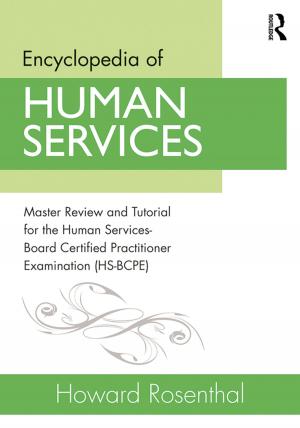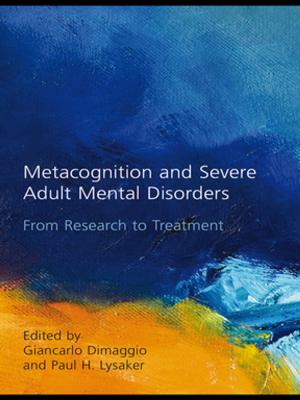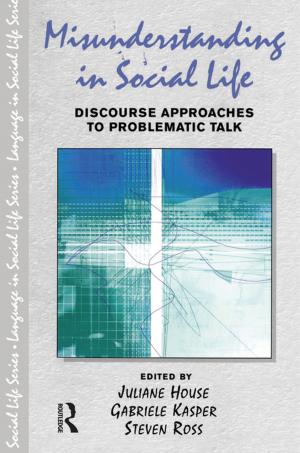Personal Identity and Applied Ethics
A Historical and Philosophical Introduction
Nonfiction, Religion & Spirituality, Philosophy| Author: | Andrea Sauchelli | ISBN: | 9781317288541 |
| Publisher: | Taylor and Francis | Publication: | November 10, 2017 |
| Imprint: | Routledge | Language: | English |
| Author: | Andrea Sauchelli |
| ISBN: | 9781317288541 |
| Publisher: | Taylor and Francis |
| Publication: | November 10, 2017 |
| Imprint: | Routledge |
| Language: | English |
'Soul', 'self', ‘substance’ and 'person' are just four of the terms often used to refer to the human individual. Cutting across metaphysics, ethics, and religion the nature of personal identity is a fundamental and long-standing puzzle in philosophy.
Personal Identity and Applied Ethics introduces and examines different conceptions of the self, our nature, and personal identity and considers the implications of these for applied ethics. A key feature of the book is that it discusses a range of different approaches to personal identity; philosophical, religious and cross-cultural, including perspectives from non-Western traditions. Within this comparative framework, Andrea Sauchelli examines the following topics:
- Early views of the soul in Plato, Christianity and Descartes
- The Buddhist 'no-self' views and the self as a fiction
- Confucian ideas of our nature and the importance of self-cultivation as constitutive of the self
- Locke's theory of personal identity as continuity of consciousness and memory and objections by Butler and Reid as well as contemporary critics
- The theory of 'animalism' and arguments concerning embodied theories of personal identity
- Practical and narrative theories of personal identity and moral agency
- Personal identity and issues in applied ethics, including abortion, organ transplantation, and the idea of life after death
- Implications of life-extending technologies for personal identity.
Throughout the book Sauchelli also considers the views of important recent philosophers such as Sydney Shoemaker, Bernard Williams, Derek Parfit, Marya Schechtman and Christine Korsgaard, placing these in helpful historical context.
Chapter summaries, a glossary of key terms, and suggestions for further reading make this a refreshing, approachable introduction to personal identity and applied ethics. It is an ideal text for courses on personal identity that consider both western and non-western approaches and that apply theories of personal identity to ethical problems. It will also be of interest to those in related subjects such as religious studies and history of ideas.
'Soul', 'self', ‘substance’ and 'person' are just four of the terms often used to refer to the human individual. Cutting across metaphysics, ethics, and religion the nature of personal identity is a fundamental and long-standing puzzle in philosophy.
Personal Identity and Applied Ethics introduces and examines different conceptions of the self, our nature, and personal identity and considers the implications of these for applied ethics. A key feature of the book is that it discusses a range of different approaches to personal identity; philosophical, religious and cross-cultural, including perspectives from non-Western traditions. Within this comparative framework, Andrea Sauchelli examines the following topics:
- Early views of the soul in Plato, Christianity and Descartes
- The Buddhist 'no-self' views and the self as a fiction
- Confucian ideas of our nature and the importance of self-cultivation as constitutive of the self
- Locke's theory of personal identity as continuity of consciousness and memory and objections by Butler and Reid as well as contemporary critics
- The theory of 'animalism' and arguments concerning embodied theories of personal identity
- Practical and narrative theories of personal identity and moral agency
- Personal identity and issues in applied ethics, including abortion, organ transplantation, and the idea of life after death
- Implications of life-extending technologies for personal identity.
Throughout the book Sauchelli also considers the views of important recent philosophers such as Sydney Shoemaker, Bernard Williams, Derek Parfit, Marya Schechtman and Christine Korsgaard, placing these in helpful historical context.
Chapter summaries, a glossary of key terms, and suggestions for further reading make this a refreshing, approachable introduction to personal identity and applied ethics. It is an ideal text for courses on personal identity that consider both western and non-western approaches and that apply theories of personal identity to ethical problems. It will also be of interest to those in related subjects such as religious studies and history of ideas.















